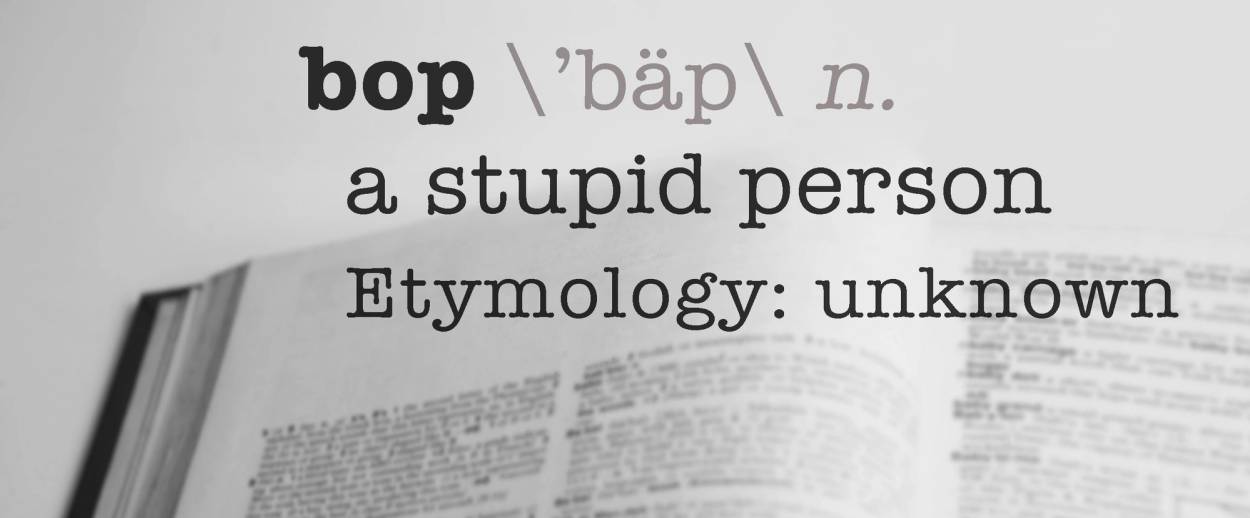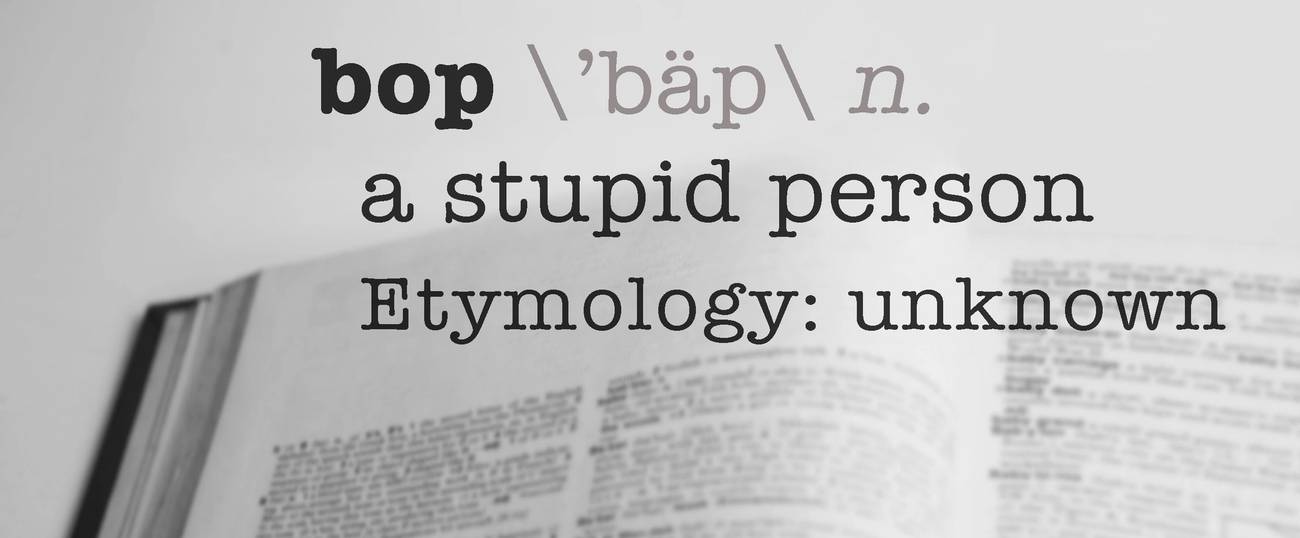Don’t Be a ‘Bop’
In my family, we had a special three-letter word for stupid people. But where did it come from?




In my family there’s a word with no known etymology. I’ve never heard anyone else use it; the Internet bears no traces of it. It came from the mouth of the patriarch, my father’s father, and tumbled down the generations.
bop \’bäp\ n : a stupid person
I didn’t know it was made up. I never questioned anything my grandfather told me. (In kindergarten, as a result, I announced that chocolate milk came from brown cows.) Mostly my grandfather taught me real things, like the fact that light switches are placed just inside rooms so that you can find them in the dark. Or that the painting over his recliner, an impressionistic sunset over water, had to be a West Coast scene, because the sun set in the west, and where we lived, on the southeast Georgia coast, the ocean lay in the other direction.
My grandfather’s relationship to me was pedagogical, explicitly so, and what he most wanted to teach me about were words. Not just what they meant but how to delight in them. Instead of milk my grandfather and I said klim. Theda Bara, he explained, was an anagram of Arab death. He taught me the difference between transparent, translucent, and opaque. We did crosswords and word search puzzles. A perfectionist in language, he said, was a purist.
Cher, he said, is short for Cherokee. Which is something he really believed.
But bop was a word he never explained, perhaps seeing no more need to define it than the word dope itself. Maybe he thought bop was too ugly—he also never mentioned the etymology of the words shvartzer or nigra, his terms, meant to sound no more than half-derogatory, for black people. Or perhaps there was nothing to say about the word bop—at least nothing true.
***
Bop sounds Yiddish, but it doesn’t appear in Yiddish dictionaries. The Yiddish word for fool is nar, which I never heard once in my family, though it’s as short and easily pronounced as bop. Shlemiel, shmendrick, shmuck, shmegegge, behaimeh—the other options my Yiddish dictionary proposes—were in circulation in my family when I was growing up. But they don’t really mean fool. A behaimeh is a beast. Shlemiels, shmendricks, and shmegegges are losers, but they aren’t just or even necessarily stupid; they’re buffoons, klutzes, jerks. A shmuck is a prick.
And while bop does appear in English dictionaries, that’s not the word my grandfather was using. Webster’s defines bop as a blow or as a diminutive of bebop; the second definition for the latter usage is “jive.” My grandfather and father—they were the ones who mostly used bop—certainly wielded the word as a club. Calling someone a bop was like bopping him on the head, though they never said it to their victim’s face. But to them the word, while used to inflict a blow, meant something else: a fool.
“We don’t have bops in this family,” my grandfather used to say. “We drown them at birth.” As a kid I learned that my grandmother in her younger days disposed of surplus kittens by bagging them up and dropping them from the bridge across the Savannah River. Murdering kids sounded suspect, drowning kittens, believable; but in my child’s imagination the two merged into the single terrifying image of a baby in a bag sent hurtling toward black water—surely these people would be discreet enough to wait for the cover of night.
My father recently clarified that my grandfather considered a bop “specifically someone who was a dope and was poor.” This nuance had escaped me, and my father himself only arrived at this definition after I prompted him for memories of when my grandfather used the word. “I don’t want to name names,” my father said, instead listing entire job groups—shoemakers, butchers, tailors—whose practitioners my grandfather dismissed as bops. According to my father, anyone who did anything at all except what my grandfather himself did, which was practice law, was a bop.
The additional attribute of poor might explain why nar didn’t suffice. It might also support a theory of mine that bop comes from bubkes or bupkes, Yiddish for “nothing.” Bubkes, pronounced “bop kiss,” can be used to dismiss anything or anyone as worthless.
Webster’s associates bubkes—as well as kozebubkes, a word for goat droppings from which bubkes is probably derived—with Slavic and Polish words for beans. Remember poor Gimpel, his hand loaded up by the other boys with goat poop for raisins.
If bubkes is itself a diminutive, then perhaps my grandfather, or whoever first called someone a bop, was just shortening the original word a little more. This sounds like a natural progression, but the fact that no one outside our family has ever done it, that bop is never used in this way, makes it feel central to my family’s worldview, or at least the world I came out of. My father’s first definition of bop was the same as mine—a dope—but the more he thought about it, the more the word came to mean a nothing.
***
My grandfather, according to my father, looked down on “anyone who didn’t earn a living with his brain … even professionals if they used their hands,” including doctors. My father explains that this was because he never got the respect he felt he deserved, was ignored, even hated, because of his terrible personality, his fiery temper. This was not the grandfather I knew, but it explains a lot about my father, who worked with his hands. “Someone who sits at a desk, like a lawyer,” my father told me in high school, “isn’t really working.” Needless to say, I earn my living by sitting at a desk.
After graduating from college I moved to Brooklyn and looked for work in publishing, having long ago ditched my parents’ dream that I’d become a doctor. My father sent me letters making it clear, not that I was a bop but that I was acting like one. Or at least that my life was bupkes. “Your peers are getting ahead of you,” he once wrote, naming names and then went on for pages in this vein. I cut off communication with him for the summer to avoid this kind of unpleasantness; but I never felt like a loser. If anything I felt sorry for this man, so intent on persuading but with a means guaranteed only to push me away.
When my thinking runs along these lines, I like to go back, in my head, to my grandfather’s house, full of rooms to explore and grown-up books, like Lolita and Valley of the Dolls, to secretly read. As a kid I spent every weekend there. I like to go back to those nights when Grandpa banished Grandma upstairs and I slept with him, swimming in the night to his side of the bed to cling to his back, bask in his bearlike warmth.
I was never witness to my grandfather’s famous temper; but he could be temperamental around me. The older I got, the less interested I became in sleepovers at the big house. He retaliated by refusing to open his front door to me unless I begged forgiveness for the crime of ignoring him, unless I pleaded to be admitted.
But the effects of my grandfather’s temper on our relationship never went much beyond these displays of bruised feelings and my somewhat desperate attempts to make up with him. He never called me a bop, and in his eyes I could never be one. I knew this not because I was so smart, but because once my grandfather categorized someone as one thing—smart, stupid, beautiful, ugly, successful, hopeless—he never changed his mind.
***
I can’t remember when I last called someone a bop, and I don’t recall saying it much, if ever. It was for the adults in my family, not the kids, to decide who counted and who didn’t. By the time I became an adult I had quite consciously become a different person, no longer a Friedman with all the name’s misanthropic connotations, its reverence for conventional success and scorn for the unbrainy. When asked about bop’s source, my father said, “I wonder if my father heard it from his father. I’ll never know but he used it all his life.” In my father’s speculative etymology, the word and its worldview are passed from father to son. But the buck, I want to believe, ends here, even as I suspect that my sensitivity to the insensitivity of others might compensate for my own rotten impulses. I reserve the term idiot or moron for the morally reprehensible, the Trumps of the world; in this way I justify my own expression of the contempt for others that my father and grandfather wielded so naturally and from which I’ve been running my entire adult life. When a review of my story collection called out my sympathy for even my most minor characters as an artistic failing, a distraction, I considered it a compliment.
My father consciously channels his father whenever he uses the word bop, which he does now and then. Most recently he applied it to my Uncle Sam on the other side of the family, a man who devoted decades to caring for his quadriplegic brother, Jack. But I don’t think this is what made him a bop. It was only Uncle Jack’s death that freed up Uncle Sam, like Anse Bundren in As I Lay Dying, to travel to the capital and attain his object of desire; Anse acquires a new set of teeth, while Uncle Sam got himself a redheaded widow. And it was this wife, my father explained, who made Uncle Sam cut off relations with his own family and who ended up taking all his money, what money he had, for herself and her own children. But before all this, when Uncle Sam and the widow from Atlanta had just gotten married, my parents invited them to dinner. After a month of silence, my father asked Uncle Sam when the newlyweds might be available. “When you get to the top of the list,” Uncle Sam supposedly replied. Uncle Sam was a bop, my father concluded, for leaving everything to his wife. (My uncle never seemed to make much of a living, but after his brother’s death it turned out he’d stashed away enough kishke gelt, money saved through great sacrifice, to win over the widow.) But my father’s impulse to attack this sweet man—who sacrificed his life for his brother, who’d open his spare room full of jawbreakers and eyeballs and capsuled creatures from his gumball machine business and give us kids whatever we wanted—came from that long-ago slight, the dinner invitation spurned.
My grandfather and father shared a name—rare among Jews and a story in itself. If my father’s portrait of his father is correct, they also share a psychology transparent to everyone but themselves. Their egos were as fragile as fraises des bois, unable to withstand the slightest examination or touch. They were easily bruised, and their wounds never healed. The least difference was intolerable; other people were threats that had to be neutralized, written off as dopes, reduced to nothing.
B-o-p. Three letters were all that stood between these men and desolation. How much they did with so little.
***
Like this article? Sign up for our Daily Digest to get Tablet Magazine’s new content in your inbox each morning.
Jason K. Friedman won the Mary McCarthy Prize in Short Fiction and the Anne and Robert Cowan Writers Award for Fire Year.